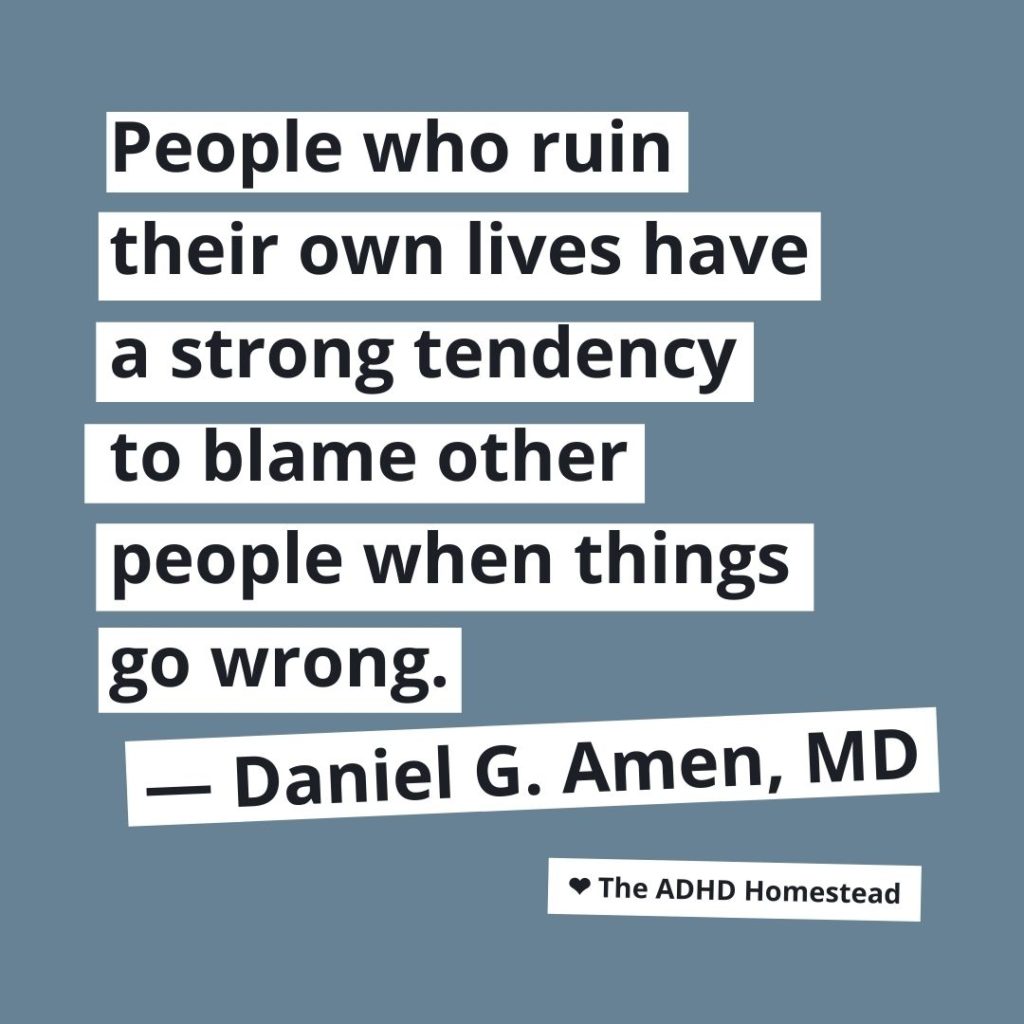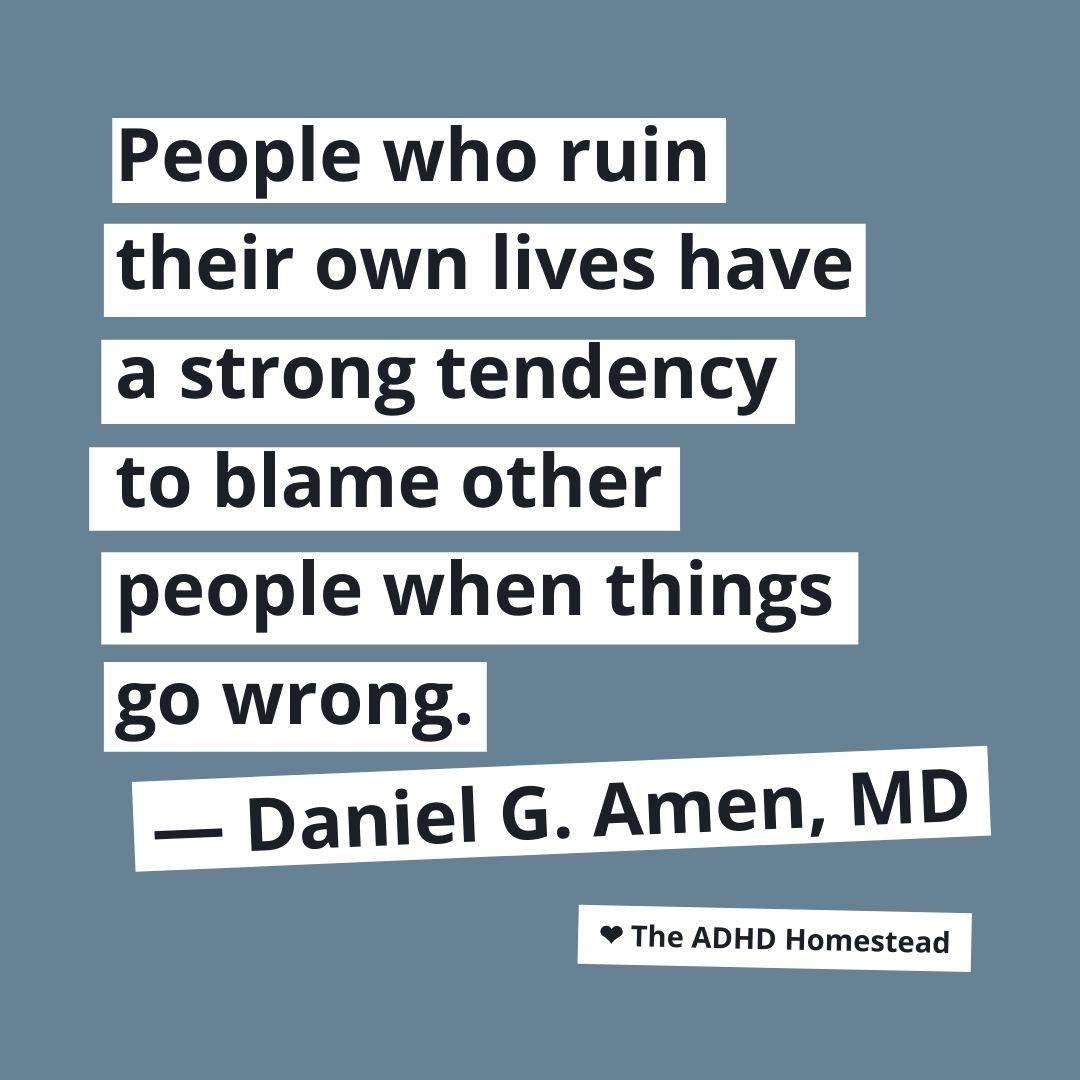If you love someone with ADHD, you may know too well how blame shifting hurts a relationship.
There are many ways to shift the blame:
“If you didn’t make me so angry all the time, I wouldn’t explode at you. Would you rather I bottled it all up?”
“I wouldn’t have gotten a speeding ticket if you hadn’t asked a bunch of questions when you knew I was trying to get out the door.”
“I never thought I’d be the type to cheat, but you made me feel so unappreciated.”
“You and Dad never modeled a healthy relationship for me. No wonder my marriage fell apart.”

For the purposes of this post, let’s look at a smaller-scale example:
Suppose you’re having company over tonight. Your husband1 meant to take pork chops out of the freezer last night, but he forgot. He arrives home from some errands at 4:30, ready to marinate the chops so he can throw them on the grill when your guests arrive.
Upon discovering the meat still in the freezer, he blows up at you:
“Great! Now dinner is ruined! You were here all day and you couldn’t have noticed the meat wasn’t in the fridge? Every time I think you have my back, you’re just thinking about your own stuff and doing your own thing. All our other married friends work together as a team. You make me feel like our relationship is just every man for himself…”
And on and on.
First thing’s first: blame shifting is abusive behavior
In describing this behavior to your friends — or searching the internet — you may hear people call it psychological abuse. But does this mean you’re in an abusive relationship and you need to leave?
Maybe — but it’s rarely that simple.
Unmanaged ADHD can absolutely lead to abusive behavior. Willingness to acknowledge, learn about, and treat it can make or break an intimate relationship. But while an ADHD diagnosis can explain a lot of relationship problems and help us identify solutions, it doesn’t give us license to mistreat others. No one should accept continued abuse from an ADHD partner who refuses to take responsibility.
At the same time, learning about ADHD can start us on the path to becoming our best selves. Within my own family, I’ve seen people undergo change I never imagined possible, making amends for past harm and forging stronger, more emotionally safe connections with loved ones.
Labeling someone an abuser and severing ties often feels no less wrong than continuing the status quo. And some people, especially minors living with a volatile parent, don’t feel like they have the option to “just leave.”
I wrote this post at the request of someone who neither wanted to abandon their loved one nor considered such a move warranted or appropriate. Yet they wanted to know: why does this happen? How can I defuse the situation instead of fanning the flames? How can I set boundaries to protect my own mental health? That’s what I want to address here: the how, the why, and what we can do about it.
However, if you’re in an abusive relationship that feels emotionally unsafe2, please take immediate steps to find support and protect yourself. You’re not responsible for fixing or managing an abusive partner.
Why we blame others
It’s easier to blame someone else than it is to accept our own (often overwhelming) faults. It’s also easier to cast ourselves in the role of the victim when faced with a blame shifter. Once we’ve accepted that role, both parties learn to play their part like it’s second nature.
Before we write off a blame shifter as incurably abusive and ill-intentioned, we should take a closer look. The ability to see a situation from multiple angles and experience emotions without being blinded by them is a marker of strength. We can assert and protect ourselves in ways other than walking out the door.
As we seek that steady foundation, we need to remember why people tend to mistreat others. As a child, I remember my mother telling me other kids picked on me because they felt badly about themselves. Bullies of all ages use others to shift focus away from their own hurts.
In his book Healing ADD from the Inside Out, Dr. Daniel Amen writes, “people who ruin their own lives have a strong tendency to blame other people when things go wrong.” Consider the pain, humiliation, and self-loathing weighing on the hearts of so many ADHD adults. It’s easy to see how blame shifting and other emotionally abusive behaviors become the path of least resistance.
Accepting even a minor failure — like forgetting to take the meat out of the freezer — can feel like too much to bear if ADHD has already decimated your self-image. If you allow yourself to own that one misstep, you open the floodgates. You confirm your worst fears about yourself and reinforce your most damaging self-criticisms.
Disarm with compassion and clarity
I’m not excusing bad behavior. I’m seeking explanations beyond “so-and-so is just a bad person.” When you’re feeling wounded by a blame shifter’s words, try to remember they’re hurting, too. This knowledge may make it easier to begin from a strong and productive place rather than simply retreating or attacking back.
And it does take strength. The best first step in a conflict is to acknowledge your own contribution, even if the other person is wrong.
Why? Because this removes the blame shifter’s weapon. You cannot assume a position of strength without making yourself vulnerable. When someone shifts the blame, that’s a good signal that they’re coming from a place of weakness. They will redouble their attacks if you begin by focusing on their faults.
When acknowledging your contribution, don’t dwell on blame or get melodramatic. The idea is to communicate to the other person, “I’m not interested in discussing who’s to blame here” and move on.
In the case of the frozen meat, that means saying, “I’m sorry I didn’t notice when I went into the fridge to get my lunch. If I had, we may have been able to get the meat thawed in time.”
You may fear you’re just rewarding bad behavior. There’s inherent risk in making yourself vulnerable. But consider your options. If you argue, deny, and try to pass the buck back to the blame shifter, you’ll make him feel even more threatened and prone to attack. You could slink away, refuse to engage, and wait for it to blow over, but that makes you an ideal target: a person who won’t stand up for yourself. A person who will allow someone to tear you down to make themselves feel better. That’s not okay.
Be firm and kind, and check your emotions
After accepting your contribution, be firm. Don’t enable blame shifting now or in the future. Help the blame shifter see their role in the situation by making clear, non-threatening observations about what happened.
Avoid statements that aren’t about you: “you said you’d be in charge of the meat. I shouldn’t have needed to worry about it.”
Instead, describe only your own feelings, observations, and interpretations: “the meat wasn’t on my radar. I guess I kind of forgot about it after we decided you’d grill and I’d make the side dishes. It sounds like you’d like for us to check on each other a little more intentionally to make sure nothing gets forgotten.”
This shifts focus away from finger-pointing and toward problem solving.
If the blame shifter continues to dump on you, speak up. Resist the urge to get emotional or confrontational. For example: “I feel like I’m trying to look at this from both sides. It’s not okay with me to just focus on how I messed up because that’s not what I feel really happened here. Am I making it difficult for you to have a two-sided conversation about this?”
Once a blame shifter learns you won’t take the bait and feed the flames with more emotion, they’ll stop seeing you as a viable container for their own bad feelings and low self-esteem.
You can’t do it all
Sometimes a loved one will continue behaving badly, especially if their ADHD is untreated or poorly managed. Only you can know — through experience, soul searching, and repeated attempts to open doors to effective communication — if it’s time to remove yourself from a toxic environment.
Remember there’s hurt on both sides. Rarely does responsibility for stopping the cycle rest with just one person.
Much of the advice in this post was gleaned from Douglas Stone, Bruce Patton, and Sheila Heen’s Difficult Conversations: How to Discuss What Matters Most. If you’re dealing with a poor communicator, the best thing you can do to make things better is hone your own skills and lead by example. I highly recommend Difficult Conversations as a starting point for anyone seeking to heal a damaged relationship.
Have you felt victimized by a blame shifter? What did you do? Are you a recovering blame shifter? I’d love to hear your story in the comments.
Editor’s note: this post was updated to add a section on emotional abuse, an updated image, and narration on October 14, 2020.
Footnotes:
1: Though this example is gendered for clarity and flow, people of all genders can be victims of abuse, just like people of all genders can perpetrate abuse.
2: By “emotionally unsafe,” I mean: do you always feel anxious and emotionally exhausted, either from fearing when your partner’s next outburst will come or from trying to avoid provoking them? Since being with your partner, have you become more isolated? Less capable and sure of yourself? More anxious and depressed? Do you now struggle to trust your own perception and instincts? These are huge red flags for psychological abuse. Regardless of your partner’s own mental-health reasons for treating you this way, take care of yourself first.
Hey there! Are you enjoying The ADHD Homestead?
Here's the thing: I don't like ads. I don't want to sell your attention to an advertising service run by the world's biggest data mining company. I also value my integrity and my readers' trust above all, which means I accept very few sponsorships/partnerships.
So I'm asking for your support directly. For the cost of one cup of coffee, you can help keep this site unbiased and ad-free.
Below you will find two buttons. The first lets you join our crew of Patreon pals and pledge monthly support for my work. Patrons also have access to my Audioblogs podcast. The second takes you to a simple donation page to pledge one-time or recurring support for The ADHD Homestead, no frills, no strings. Do whichever feels best for you!

